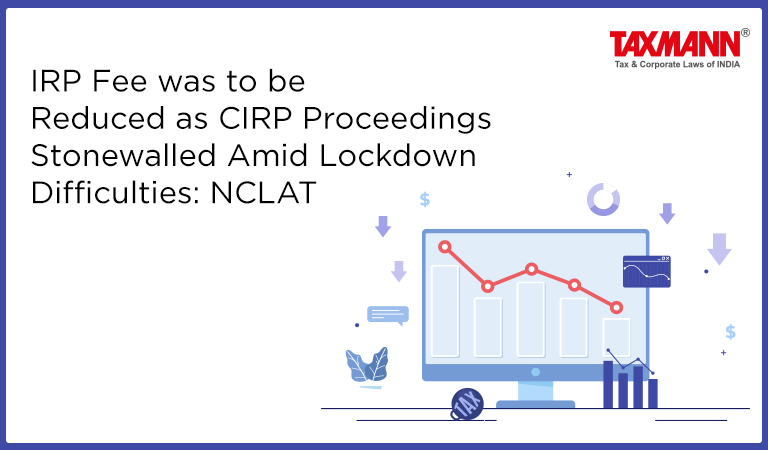IRP Fee was to be Reduced as CIRP Proceedings Stonewalled Amid Lockdown Difficulties: NCLAT
- Blog|News|Insolvency and Bankruptcy Code|
- 3 Min Read
- By Taxmann
- |
- Last Updated on 9 May, 2023

Case Details: Shri Guru Containers v. Jitendra Palande - [2023] 149 taxmann.com 350 (NCLAT- New Delhi)
Judiciary and Counsel Details
-
- Justice Ashok Bhushan, Chairperson and Barun Mitra, Technical Member
- Ms. Shreya Munoth and Ms. Aswathi Menon, Advs. for the Appellant.
- Shikhil Suri, Ms. Madhu Suri, Ms. Komal Gupta and Ms. Mahima Aggarwal, Advs. for the Respondent.
Facts of the Case
In the instant case, the appellant (i.e. an operational creditor) filed a Section 9 application against the corporate debtor, which was admitted by the Adjudicating Authority (NCLT). The Adjudicating Authority appointed an IRP to bring the corporate debtor under the rigours of the CIRP.
The IRP made a public announcement inviting claims, however no claims were filed by the operational creditor or other creditors. The IRP then filed an application before the Adjudicating Authority u/s 19 of the IBC for the issuance of directions to the suspended directors of the corporate debtor and the operational creditor to furnish requisite information for proceeding with the CIRP.
Later, the IRP filed an application u/s 60 of the IBC seeking termination of the CIRP and also sought his discharge from duties as IRP along with reimbursement of costs for duties performed.
The National Company Law Tribunal (NCLT) vide impugned order directed the operational creditor to reimburse the IRP total CIRP costs, which were incurred by the IRP in the discharge of his duties.
Aggrieved by the impugned order, the operational creditor preferred an instant appeal before the National Company Law Appellate Tribunal (NCLAT).
The operational creditor contended that the Adjudicating Authority had simply endorsed the CIRP cost claimed by the IRP without analysing whether the claim made was proportionate to the work done and the reasonableness of the claim.
The operational creditor also alleged dereliction of duty on the part of the IRP and argued that they were not obligated to reimburse the IRP for their fees/expenses. Further, the operational creditor contended that the IRP claimed disproportionately high fees as compared to the limited work undertaken by them, having only issued the public announcement.
The question placed before the Appellate Tribunal was whether the IRP was entitled to claim fees and expenses incurred in the CIRP proceedings and, if so, whether it was incumbent upon the operational creditor to bear such fees/expenses subject to their being reasonable.
NCLAT Held
The NCLAT observed that the scope of the CIRP-related work became limited and restricted by the fact that progress got stonewalled due to a lack of flow of information from the management of the corporate debtor and a lack of claims from creditors.
The NCLAT, further observed that since the IRP had discharged his duties with due diligence in furthering the CIRP, he was entitled to the CIRP fees/expenses and there was no merit in the instant appeal to set aside the impugned order.
The NCLAT also observed that Regulation 33 of the IBBI (Insolvency Resolution Process for Corporate Persons) Regulations, 2016 clearly provides that the applicant shall bear the expenses to be incurred by or on the IRP. As the operational creditor had initiated the CIRP proceedings, which had led to the appointment of the IRP, it was incumbent upon the operational creditor to pay for the CIRP expenses.
The NCLAT held that a substantial portion of work was hit by lockdown and proceedings were stymied, and, therefore the quantum of fees allowed by the Adjudicating Authority was to be reduced and the same was to be paid by the operational creditor within two weeks.
Disclaimer: The content/information published on the website is only for general information of the user and shall not be construed as legal advice. While the Taxmann has exercised reasonable efforts to ensure the veracity of information/content published, Taxmann shall be under no liability in any manner whatsoever for incorrect information, if any.

Taxmann Publications has a dedicated in-house Research & Editorial Team. This team consists of a team of Chartered Accountants, Company Secretaries, and Lawyers. This team works under the guidance and supervision of editor-in-chief Mr Rakesh Bhargava.
The Research and Editorial Team is responsible for developing reliable and accurate content for the readers. The team follows the six-sigma approach to achieve the benchmark of zero error in its publications and research platforms. The team ensures that the following publication guidelines are thoroughly followed while developing the content:
- The statutory material is obtained only from the authorized and reliable sources
- All the latest developments in the judicial and legislative fields are covered
- Prepare the analytical write-ups on current, controversial, and important issues to help the readers to understand the concept and its implications
- Every content published by Taxmann is complete, accurate and lucid
- All evidence-based statements are supported with proper reference to Section, Circular No., Notification No. or citations
- The golden rules of grammar, style and consistency are thoroughly followed
- Font and size that’s easy to read and remain consistent across all imprint and digital publications are applied



 CA | CS | CMA
CA | CS | CMA
